TMU grad lives her dream at 2024 Paris Olympics
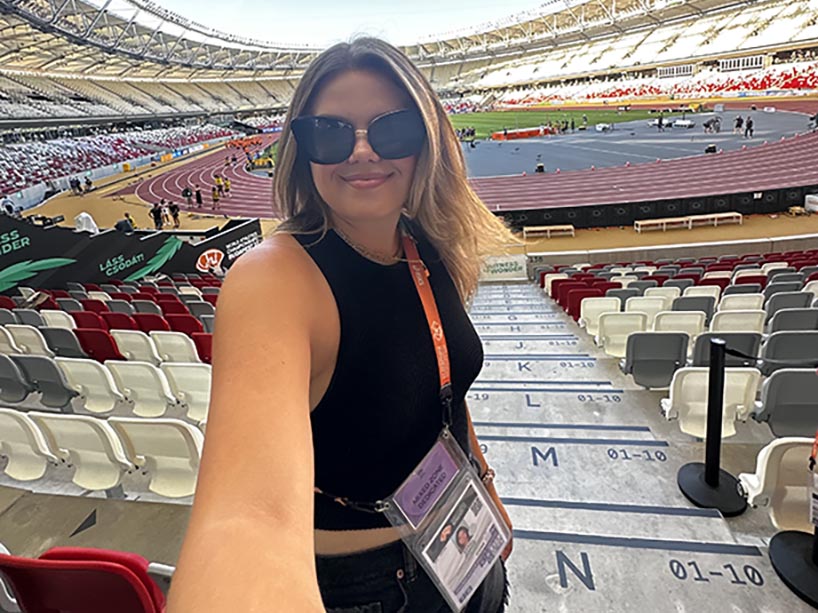
TMU Sport Media grad Sarah Jenkins takes a selfie while covering the Budapest 2023 World Athletics Championships. Paris 2024 will be the first time she’s at an Olympic Games in-person. (Photo: Courtesy of Sarah Jenkins)
When Sarah Jenkins was 17 and living with her parents in Cobourg, Ont., she scrawled her future goal into a notepad: “Go to the Olympics.”
It didn’t matter how she went – she just wanted to go.
Today, 10 years later, the sport media grad from TMU is packing her bags to do just that.
This summer, Jenkins will be leading CBC’s digital coverage of the 2024 Olympics in two different shows, Paris Tonight and Streets of Paris.
“I’m so excited – it’s so surreal,” she said.
Having grown up playing hockey, cheering on her sisters in canoe/kayak, and watching the Olympics with her family, Jenkins says for her, the Olympics have always been the ultimate competition.
“As a young girl growing up in sport, the Olympics was really the only place you could look to where both men and women were competing at the highest level,” she said. “Thank goodness that’s now changing – we’re finally getting professional sports leagues that young girls can look to as careers. But back then, for me, the Olympics was the top level to aspire to.”
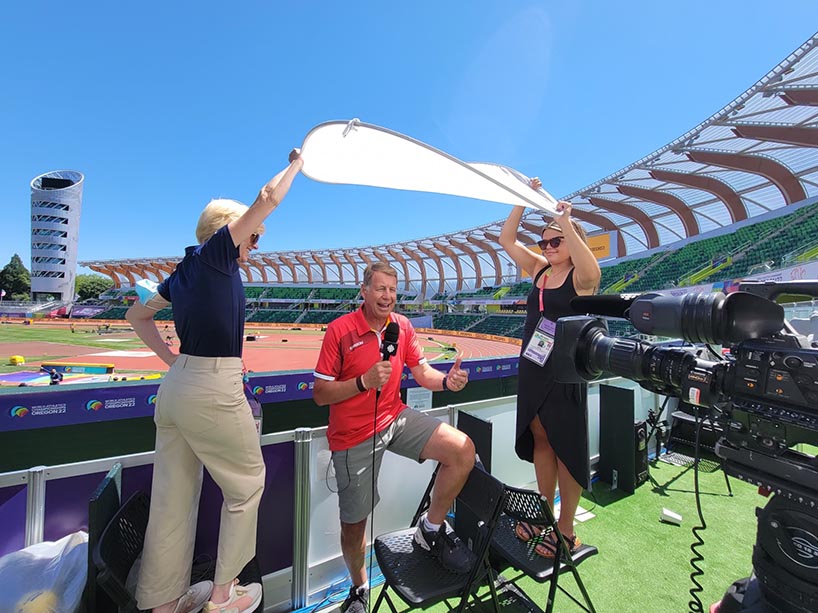
Sarah Jenkins, right, with longtime CBC host Scott Russell, centre, and Diane Sauve, left, at the Eugene, Oregon 2022 World Athletics Championships. Russell recently announced he will be retiring after the Paris Olympics. (Photo: Courtesy of Sarah Jenkins)
TMU kickstarts dream
Years later, when Jenkins began university, TMU’s sport media program was an obvious choice.
“I remember in first year, when my prof, Karen Sebesta (former executive producer at CBC Sports) asked us why we were in the class, I put up my hand right away and said, ‘To cover the Olympics,’” she said.
And today, as producer of strategy and special projects for the digital team – the TMU grad is bound for her first Olympic Games – and is the only editorial producer heading to France.
“I'll be co-producing with another TMU alumni, Aaron Dutra (who will be based out of Toronto). We'll be co-producing a late night show called Paris Tonight with Ariel Hawani, which will be really great,” she explained.
“Then I'll also be producing a segment called the Streets of Paris, which is a cultural series we're doing there. And then I'll also be doing social content for any sports,” she said, joking, “No, I’m not going to sleep.”
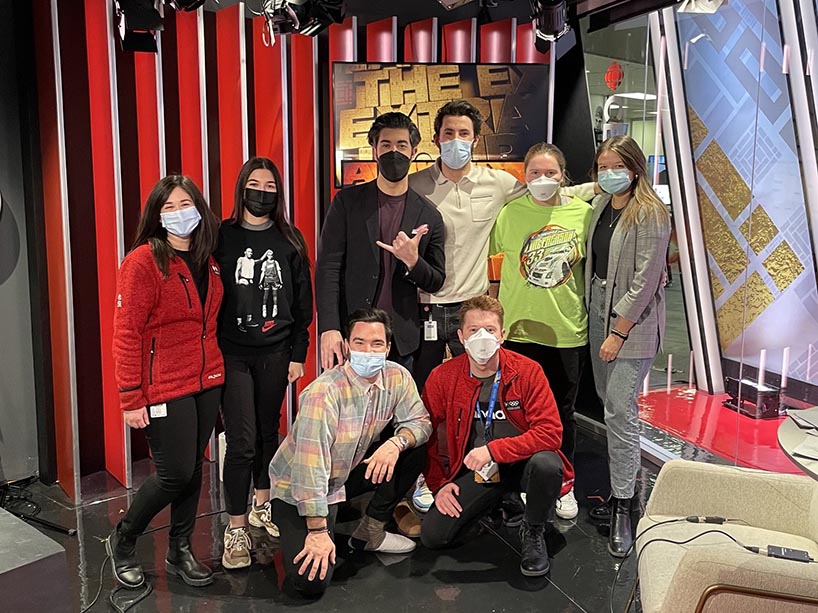
Sarah Jenkins, standing at far right, with the Extra Hour team from Beijing 2022. (Photo: Courtesy of Sarah Jenkins)
Since this will be the first Olympics post-pandemic, she says it’s the first time in many years that media will have the chance to showcase life in the host city.
“Young people are obsessed with Paris,” she said. “Like it's cool, it has art and food and history, and everything Gen Z likes. So, I think on that front, we're going to have the opportunity to reach more people beyond sport,” she said, noting the contrast to the 2020 Tokyo Olympics, where athletes had to quarantine and reporters weren’t able to capture daily life.
Airport greeter
Jenkins graduated from TMU in 2018 – and says her career path began within those classrooms.
During the lead up to the 2016 Rio Games, about a year after Jenkins told Sebesta and her class about her dream, her Olympic journey began.
“My first job was picking up athletes at the airport who were coming in for the Olympic Summit. There I am picking up Clara Hughes and all these iconic Olympians – and I’m just standing there with my little sign, and I wore high heels because I wanted to look professional but my feet were bleeding at the end of the day,” she said with a laugh.
“But it was literally because I was in Karen's class. She was really the one that got me in the door,” she continued.
From that point onward, as Jenkins continued her studies, opportunities to cover the Games continued. She’s now covered four Games in total – all from CBC’s broadcasting centre in Toronto.
“I get a lot of questions, like, ‘How do you get into the industry? But, honestly, I wouldn't work where I am now if I hadn’t been in that program or had those professors,” said Jenkins.
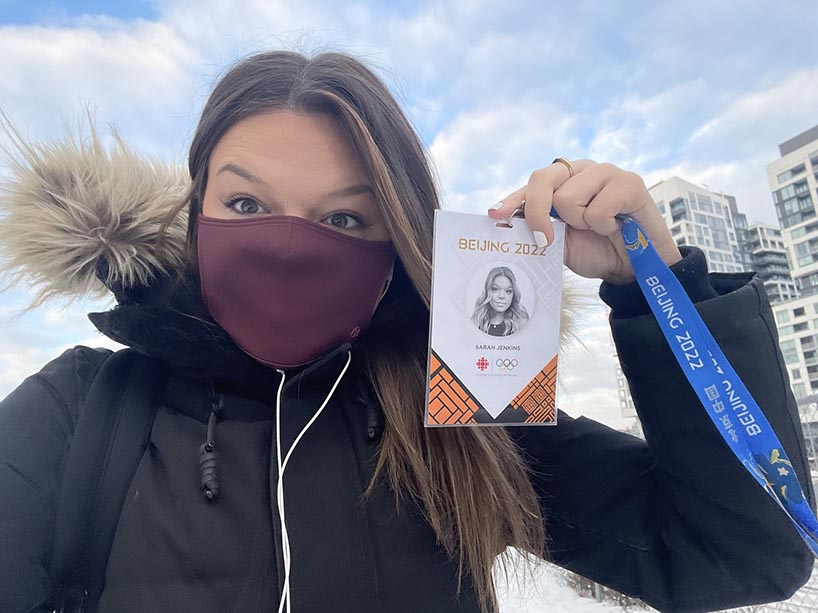
TMU graduate Sarah Jenkins had the chance to produce the 2022 Beijing Games – but did so from Toronto due to the pandemic. Paris 2024 will be the first time she can be at the Olympics in-person. (Photo: Courtesy of Sarah Jenkins)
Hard skills are key
She says having both the hard and soft skills has been key.
“TMU was a hands-on learning university. I didn't want to just talk about media theory and then have to go do a post-grad somewhere else,” she said.
"Getting to go to the Olympics this year – honestly, the reason I get to go and be on the ground is because I have the practical skills. We used to send seven people in the role that I'm now doing."
“If we need to pick up an edit while we're on the ground, I know how to edit, create graphics and do Photoshop. I can be a self-sufficient producer, editor or host, if needed, all of it,” she continued.
Storytelling at the core
To be successful in a constantly shifting digital world, Jenkins says she follows a few key rules.
For instance, if a new platform emerges, it’s not about changing the type of content that’s produced, but rather, looking at how it can be adapted for that new channel.
“For example, Streets of Paris is the same concept that’s been on TV for 10 years. It’s just going to be told in a slightly different way. That might just be adding a punchier opening on TikTok to catch attention – but I’m not changing my entire strategy just because an algorithm changed,” she explained. “That’s how we stay current – we don’t change our values – we adapt for the platform but stay focused on the storytelling.”
She also says that in the social space, listening and reacting has been crucial, as opposed to overly planning.
For example, when in Paris, if audiences seem hungry for content of behind-the-scenes tours, she’ll focus on that. But if her audience seems curious about what athletes are eating in the Olympic Village, she’ll shift gears.
“We don't pre-produce nearly as much anymore from a digital perspective, because we can’t know what’s going to go viral. If it's the stuff that just happens in the moment, I can't plan a TikTok trend right now, because it's not going to be the same trend that's two months from now. So you just have to be aware of what's happening, and react to it at the moment.”
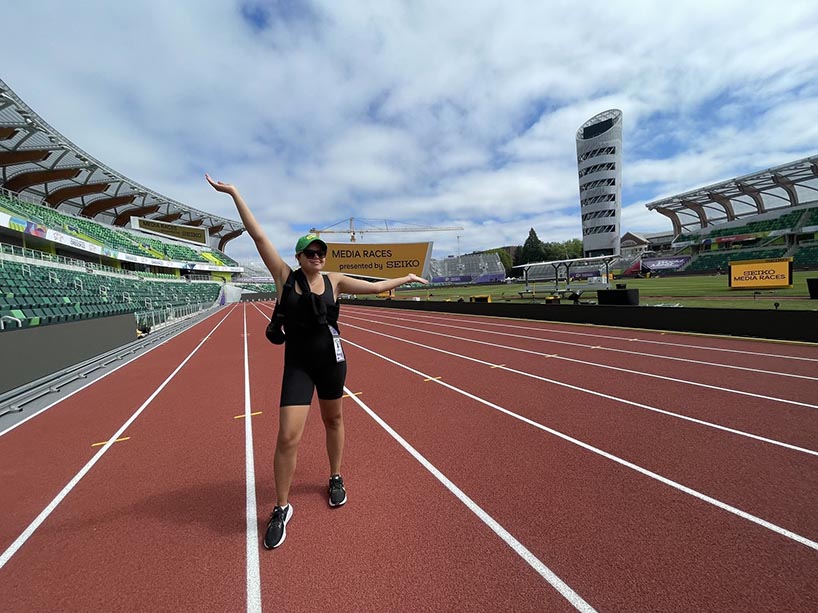
Sarah Jenkins poses on the track at the 2022 Eugene Oregon World Athletics Championship where she competed in an event for media. (Photo: Courtesy of Sarah Jenkins)
Classmates to colleagues
As for advice to current students, in addition to honing practical skills, Jenkins says to nurture their relationships with classmates, since “they will be your future colleagues”.
“In my career so far, anyone I have either hired or worked with – it’s all sport media alumni. I think we look out for each other, and we also all know the type of quality that we produce and the type of skill sets we have because we all went to the same program. Literally, the reason I work in sports media in Toronto is that program. I wholeheartedly believe that.”
And, it’s given her the chance to live her dream.
“I mean, they, the only time the world comes together is over war or over the Olympics, right? And so, I just feel like this is a chance to add to that culture, and do something important,” she said.
Related:





